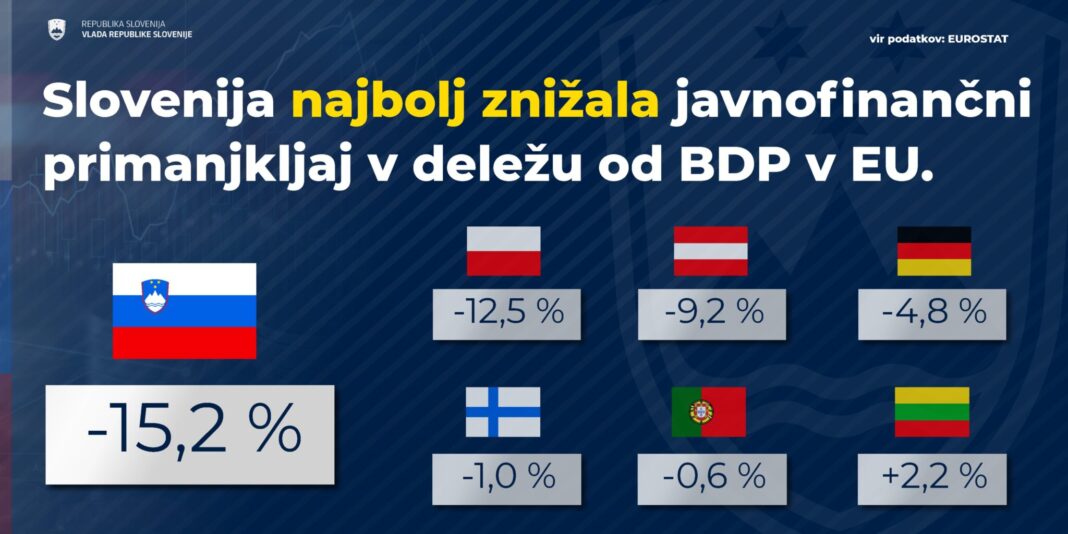By: Sara Rančigaj / Nova24tv
The coronavirus epidemic has caused great devastation in the European and world economy, and the countries have reacted to the crisis caused by the coronavirus in many different ways. Slovenia was quite successful in this matter, as the indicators show exceptional remediation of the budget deficit, and Slovenia can also be proud of having a much lower public debt than many of the other EU countries.
Slovenia remains within the limits of indebtedness that have been forecast for the entire European Union, and it ranks much better in terms of forecasts regarding public debt borrowing and the budget deficit. For example, the average projected indebtedness over the next three years, in terms of government debt in the European Union, is much higher than our average. The debt of the European Union member states is projected to be significantly higher than Slovenia’s in the next three years and will amount to somewhere between 90 and 95 percent of GDP, while Slovenia’s debt will remain somewhere at around 80 percent, or even slightly below that.
The state’s relatively favourable public finance position, of course also affects our position on the financial markets, due to the timely measures taken by the government within the framework of the current anti-corona legislative measures. Our ratings at virtually all rating agencies are solid, and these ratings are, of course, crucial when it comes to the cost of borrowing for the cost of achieving liquidity in the financial world. These estimates have either stabilized or corrected upwards, which places Slovenia among the Member States of the European Union with the most stable fiscal picture.
The budget deficit is the excess of state budget expenditures (purchases of products and services, transfers) over state revenues (taxes). In other words, it is the balance of government revenues and expenditures and means that the state has spent more money than it has collected through taxes. The budget deficit most often occurs in times of economic crises, when the government of the country is trying to stimulate economic activity by reducing tax rates and increasing public spending. Indeed, the coronavirus epidemic has had a major impact on the economic downturn, which has reflected in a marked budget deficit, as budget revenues have fallen sharply, while the expenditures have increased sharply, due to the anti-crisis measures.
The budget deficit was 17 percent after the first half of the year, and the state successfully rehabilitated it in three months
The country created a budget deficit in the third quarter of 2020, which was linked to the government measures which were put in place to mitigate the effects of the coronavirus epidemic (the so-called direct effects of the epidemic). The budget deficit was 146 million euros (1.2 percent of GDP), while the deficit was much higher in the second quarter (17.0 percent). On the one hand, the budget deficit was due to the 2.2 percent growth in expenditure and, on the other hand, it was due to the 3.1 percent decrease in total general government revenue. The country’s total revenues amounted to 5.2 billion euros between July and September, and expenditures amounted to just under 5.4 billion euros. The general government deficit in the third quarter was offset by the growth of revenues from social contributions, which were 113 million euros or six percent higher than in the third quarter of 2019.
According to Eurostat estimates, Slovenia is the country that has best remedied its budget deficit. In the third quarter of 2020, Slovenia reduced its budget deficit by 15.2 percentage points, compared to the second quarter. Poland (12.5 percentage points) and Austria (9.2 percentage points) came closest to Slovenia in reducing their budget deficit. With a budget deficit of 1.8 percent, Slovenia is thus among the countries with the lowest deficit, while the average budget deficit in the EU is 5.6 percent.
During the coronavirus epidemic, we have reduced public debt with the help of the good estimates and favourable borrowing conditions
Compared to the end of June, the consolidated gross government debt has also decreased slightly. At the end of the third quarter of 2020, the consolidated gross government debt amounted to 36,712 million euros or 78.5 percent of the GDP. Compared to the situation at the end of the second quarter of 2020, it decreased by 174 million euros. Debt from short term securities other than shares, excluding derivates, decreased. At the end of the second quarter, the average indebtedness of the EU countries was 95 percent, and this percentage rose to 97.3 percent in the third quarter due to the coronavirus epidemic.
The largest additional indebtedness in the third quarter of 2020 can be observed in Greece, which is now indebted to almost a double amount of its GDP; Italy (154 percent of GDP), Cyprus (119.5 percent), and France (116.5 percent of GDP). The lowest indebtedness of the governments can be observed in Estonia (18.5 percent of GDP), Bulgaria (25.3 percent of GDP), and Luxembourg (26.1 percent of GDP). With less than 80 percent indebtedness, Slovenia is among the EU countries in the upper half, and at the same time, its debt is as much as ten percentage points lower than the EU average. Compared to the third quarter of 2019, public debt in the euro area has grown by almost 943 billion euros or 11.5 percentage points of the GDP, as a result of the coronavirus epidemic.

